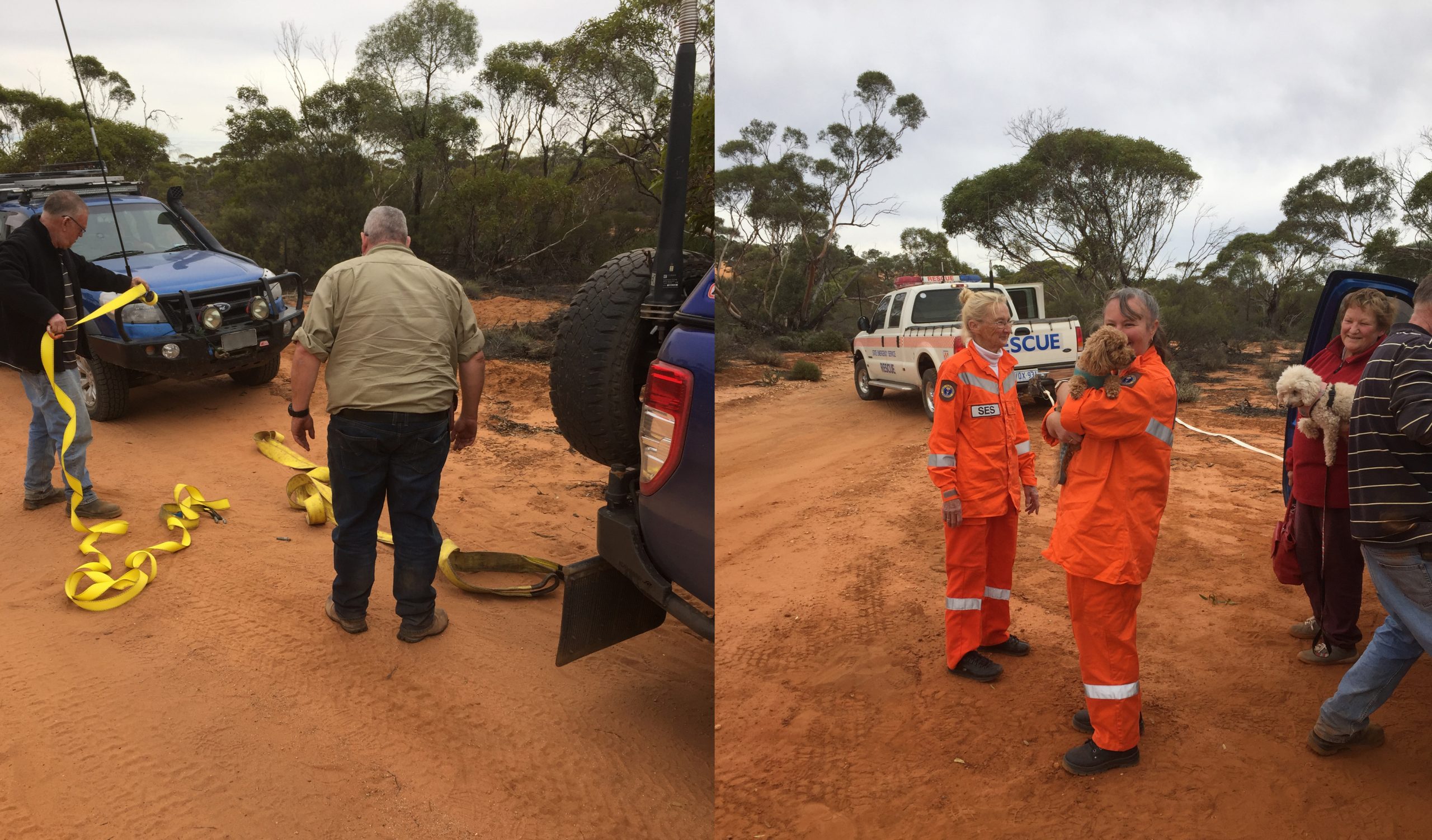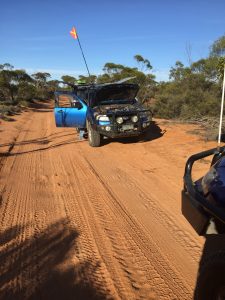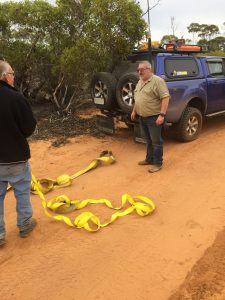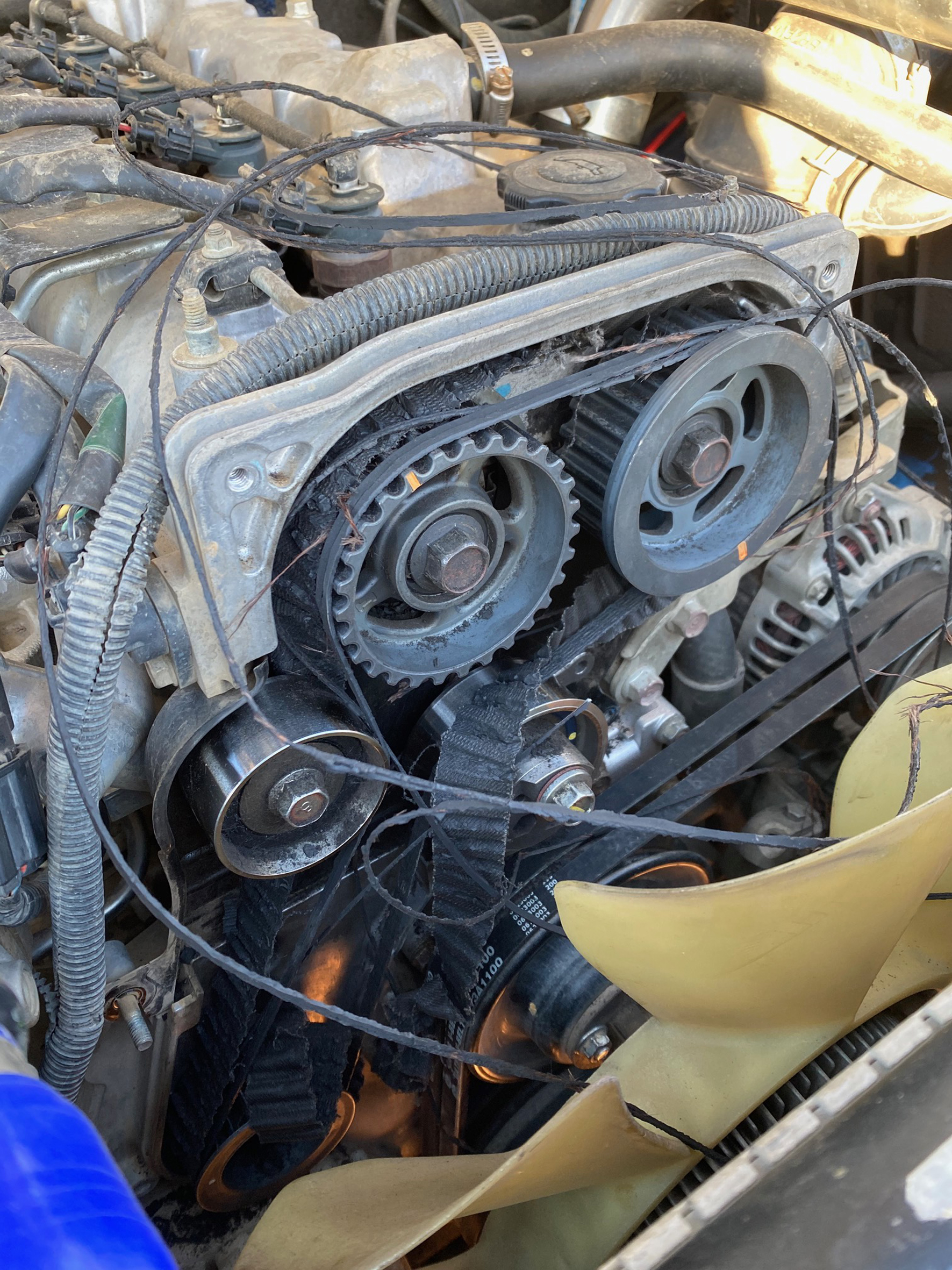Rare Engine Failure Leads To Successful Rescue:
Often Subscribers to VKS-737 Radio Network become involved, assisting travellers who become distressed for many different reasons. Here is an excellent example where our people were able to effect a successful rescue and the part that HF Radio played in it:
Recently we travelled Goog’s Track and around parts of South Australia’s Desert Country on a two week trip which was uneventful, except for one thing….
Late in May we were travelling north on Googs Track to our first camp at Googs Lake when late in the afternoon we came upon a broken down four wheel drive vehicle with a failure that most would consider rare. The couple were stranded about seven kilometres from Googs Lake, with no reliable form of communications to call for help.
The camshaft belt follower in their Ford Ranger had broken a bolt head, completely destroying the timing belt (see photo below).
Ed and his wife Sharon had left their caravan in Ceduna and driven up to Googs Lake, just for a day trip. They were only carrying enough food for their lunch. Fortunately, they had plenty of water as they’d been stranded for quite some time before we came across them.
Radio contact was made with Bart, the operator on VKS-737/RFDS Charleville Base. He handed the problem to Robert on Stawell Base. We changed to another frequency to clear the one being used for the afternoon Queensland voice skeds.
I provided Robert with all the details. He went into action to summon help, contacting the RAA in Adelaide. Relay assistance was also provided by Tony on Adelaide Base to ensure that reliable communications were maintained. Tony regularly checked on our welfare. While that was happening, we managed to tow their vehicle a short distance to a safe spot, off the main track.
The RAA tried to dispatch a towing service down on the coast however Robert advised by radio that the towing company had refused to provide any help in recovering the Ranger. Apparently, they were not willing to help anyone stranded on Goog’s Track, anywhere north of the Dog Fence. Given the seriousness of this, VKS-737 then put the matter in the hands of South Australian Police who notified Ceduna State Emergency Service Unit of Ed and Sharon’s predicament. Our vehicle was not equipped to be able to tow theirs all the way out of Goog’s Track and to further complicate matters, we were towing a Tvan.
Already late in the day, we were told by radio that Ceduna SES members were happy to provide assistance and would arrive sometime the next morning. The couple remained in their car for an extremely uncomfortable night on their front seat while we set up camp a short distance away. Ainslee and I had already decided to stay and look after Ed and Sharon for as long as it took to rescue them.
The next morning, we made radio contact with VKS-737 at the pre-arranged time to learn that the SES could possibly only rescue Ed and Sharon back to Ceduna. It looked as if their vehicle would have to be locked up and left along Goog’s Track.
Later that morning, SES members arrived, luckily in not one, but two vehicles. One of the rescue vehicles was an F250, easily able to recover Ed and Sharon’s vehicle back to Ceduna.
Speaking to Ed by phone a few days later by phone, I learned that it had been a difficult tow, recovering them back to Ceduna. Three tow straps bit the dust on the way. They were grateful to have arrived successfully and were extremely thankful to everyone involved for the assistance they’d received.
With Covid restrictions the way they’ve been this last year and lots of people choosing not to travel, this could have ended quite differently had we not planned to head onto Goog’s Track.
Ed and Sharon spent a week in Ceduna while repairs were made. Fortunately the Ranger’s engine was not destroyed from the timing belt failure and they travelled home to Culcairn, north of Albury with no further incident.
This is a good example of HF Radio to the rescue. We made the request to VKS-737 and their operators worked tirelessly to ensure a good outcome. We placed the emergency in their hands and they did the rest.
We were happy to be able to offer assistance to this couple in distress but the real credit goes to the Base Operators of VKS-737 Radio Network who give so much of their time to help others.
Also, we can’t ignore the effort that Ceduna State Emergency Service members went to ensure a safe rescue.
Clayton & Ainslee Edson
VKS-737 Editor’s Note: This story highlights how important reliable forms of communications are when travelling more remote parts of Australia. Mobile phones are useless along Goog’s Track and in most parts of Outback Australia. UHF CB Radios only provide reliable communications over very short distances.
Too many travellers spend huge amounts of money on vehicles, caravans and travelling comforts, then baulk at the things that will save their lives when everything goes pear shaped.
Be safe out there!
Categories
- 3G mobile phone (2)
- Codan Envoy (6)
- Codan Raffle (5)
- Community Service (23)
- Coronavirus (2)
- COVID-19 (3)
- Environmental (3)
- Fund Raising (2)
- HF-Tel (1)
- High Frequency (40)
- Minelab (5)
- Needing Help (11)
- News (33)
- permits (1)
- Radio (39)
- Restrictions (3)
- RFDS (7)
- Road Closures (3)
- satellite (2)
- satphones (5)
- Selcall (2)
- Sports (1)
- Travel (14)
- VKS-737 Radio Network (43)
- VKS-737 Subscribers (32)
- what3words (2)





